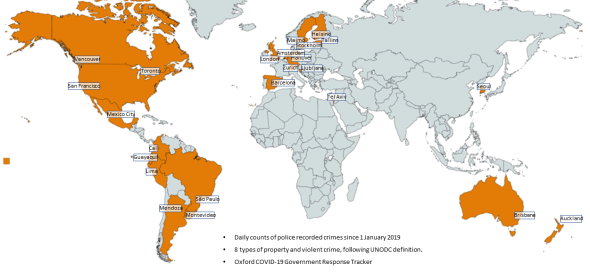
Submitted by Simone Castello on Wed, 09/12/2020 - 10:09
On Wednesday 2 December 2020, Prof Manuel Eisner was one of the speakers at a WHO webinar entitled Social Determinants of Health Webinar: COVID-19, social determinants and violence, hosted by Dr Naoko Yamamoto, WHO Assistant Director-General for Healthier Populations and moderated by Dr Etienne Krug, Director, WHO Social Determinants of Health Department. Other speakers included Prof Mark Bellis, Bangor University and Dr Faith Mwangi-Powell, CEO of Girls Not Brides.
The webinar focused on how societal responses to COVID-19 – specifically due to stay-at-home measures, workplace and school closures – had an impact on crime and violence, and how they could influence future trends in violence prevention. In particular, the talks highlighted how the pandemic intensified inequalities in many countries and among vulnerable populations. While violence and crime in the streets declined, some forms of violence increased, including child maltreatment, youth violence, intimate partner violence, sexual violence and elder abuse.
Prof Bellis talked about the links between violence and social determinants, focusing on the early years. A study of 250,000 people in England showed the strong link between poverty and violence, in particular an increasing risk of child abuse. Mental health, alcohol problems in families might lead to domestic abuse, physical abuse and sexual abuse. Other UK and US studies showed an increase in adverse childhood experiences (ACEs), with 48% suffering 1 or more ACEs in England and 62% in the US. ACEs have repercussions on health, drug abuse and mental health conditions, generating a vicious cycle of violence. ACEs can be prevented and cycle of violence can be broken – interventions save lives and resources.
Dr Mwangi-Powell talked about Covid-19 and child marriage. Girls Not Brides is a global partnership of civil society organisations committed to ending child marriage. Child marriage is a global issue and because of Covid-19, at least 13 million of child marriages are expected. The impact of Covid-19’s lockdown included school education, mental health, gender-based violence, sexual and reproductive health and rights, unintended pregnancies and economic distress. Child marriages are on the increase because they are a source of income - a dowry or “bride price” appeals to poor families. They are also seen as an income and as a protective strategy. Comprehensive measures are required to prevent and address child marriage, allowing young girls to access education and psychosocial support.
Prof Eisner focused on the effects of stay-at-home policies on police-recorded violent crime. The study is a collaboration of 23 universities. Data on police-recorded crime were collected in a number of cities across the world, involving daily counts since 1 January 2019 of eight types of property and violent crime. Prof Eisner and Prof Amy Nivette started writing about this topic as early as April 2020 in a report for the Harry Frank Guggenheim Foundation entitled Violence and the Pandemic.
Regulations to control Covid-19 - stay-at-home orders, alcohol bans, social distancing – affected social determinants of violence, generating strains such as inequality, anger, fear and stress. Types of violence recorded included assault, robbery, domestic violence, homicide, sexual violence, cyberviolence and political violence. Lima offered a good example for robbery, with 141.7 reported robberies per day before lockdown, declining sharply to 19 robberies per day after lockdown – a reduction of 87%.
All forms of police-recorded violent crime decreased, with a high decline for robbery and assault. Domestic burglary declined because there was more social control in neighbourhoods, with more people staying at home. Overall, the more stringent the measures imposed by the government were, the stronger was the average decline in crime and violence. As soon as the lockdown was over, violent crime increased again. Data showed that there might have been a peak over and beyond the typical levels prior lockdown.
Covid-19 has been a unique opportunity to understand the social dynamics involved in the causation of violence in different societies. The evidence gathered showed the relevance of environment and daily routines for understanding and preventing violence. A good example is South Africa, where an alcohol ban was imposed in conjunction with the stay-at-home order, which had a strong effect on the decline of homicide, especially among young men.
All expert contributions to the webinar highlighted that different types of violence are sensitive to economic and social changes. These findings have strong implications for future policies and prevention strategies. A lively Q&A session covered the issues of domestic violence, unemployment, gender-based violence and the impact on younger generations.
The webinar was recorded and it can be accessed at https://who.zoom.us/rec/share/SAgmfdRbA0y9UfEvdkCsE0LCBWxYQusBpNX-VpemAmr_oihnEgKK1nPXi2gAinlU.h1U165zPq4RbU2kr - access Passcode: @E+B^0Bk.
